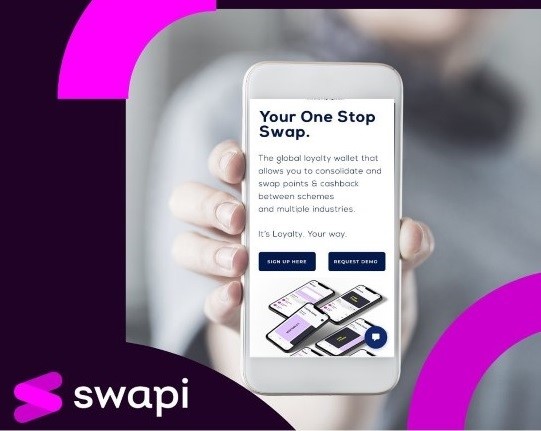More than half of consumers say that loyalty programs are the key reason they choose specific retailers and brands. Brands love these programs because they help fuel customer retention and also provide valuable data. Yet, consumers have very little power over how these programs work and how to best utilize their loyalty accruals. For example, you may have significant points on one airline but another airline is offering the same route for significantly cheaper, leaving you in a dilemma to go for the points or save the cash. Swapi is a mobile wallet and loyalty points management platform that allows users to seamlessly swap between loyalty points between different brand’s loyalty programs and spend these points through the app’s marketplace that’s integrated directly with the brands. As there’s been a growing movement toward decentralisation, Swapi empowers consumers to take charge of their consumer spend and loyalty earnings by providing unparalleled flexibility. Making that decision between loyalty and savings just got easier.
London TechWatch caught up with Founder and CEO Pete Howroyd to learn more about the experience of launching the business during the pandemic, the upcoming formal launch of the app, the company’s recent funding round, and much, much more…
Who were your investors and how much did you raise
We raised £350,000 in seed funding from a collective of angel investors including Sean Wilkinson, President of the Incentive Marketing Association Europe and Jon Bowles, founder of Cultural Capitalism Ltd.
Tell us about your product or service.
Swapi is an app that lets people swap loyalty points between brands. It will give people a new kind of power over where they spend their loyalty rewards. Instead of being tied to one company, points go into the Swapi ‘digital wallet’, freeing them up to be spent with an array of different brands in the Swapi marketplace.
What inspired the start of Swapi?
The idea came out of a desire to innovate in the loyalty sector which has been fairly static for years and also to help retail brands and businesses devastated by lockdown. There’s £6 billion worth of hidden, unspent loyalty rewards sitting unused on UK cards – a figure that climbs to $360 billion globally. Research shows that this results from a lack of engagement with loyalty schemes and inertia when it comes to spending points. I started to think about ways to tackle these problems and unlock some of that tender for the retail economy – and Swapi was the result.
The idea came out of a desire to innovate in the loyalty sector which has been fairly static for years and also to help retail brands and businesses devastated by lockdown. There’s £6 billion worth of hidden, unspent loyalty rewards sitting unused on UK cards – a figure that climbs to $360 billion globally. Research shows that this results from a lack of engagement with loyalty schemes and inertia when it comes to spending points. I started to think about ways to tackle these problems and unlock some of that tender for the retail economy – and Swapi was the result.
How is it different?
Swapi’s ‘swap technology’ is new. Existing options work by buying and selling loyalty currencies, which reduces the overall value of the reward. Plus the brands available for ‘swapping’ are limited. With Swapi users can spend their rewards with any brand in our marketplace without losing any of the value. We’re giving people a new type of power over their points, an easy process, and a fresh impetus to spend and engage with loyalty schemes.
What market you are targeting and how big is it?
Our current focus market is the retail industry, to engage as many brands for the Swapi marketplace as we can prior to launch. When we launch to consumers – which will initially be in the UK – Swapi will be relevant to a very broad audience group. Nearly everyone who shops also belongs to a loyalty scheme, with the average person holding £47 of unspent loyalty points in their pocket. Every one of these people can benefit and gain some extra spending power with Swapi.
What’s your business model?
Our business model is very simple and very similar to an affiliate-based model. We only invoice our brand partners if they benefit from using Swapi, meaning there is no risk for any of the brands in our marketplace.
How has COVID-19 impacted your business?
The business was founded at the very start of lockdown, so we have been operating under these restrictions from the start. Everything has been done virtually, from building our team to pitching for investment, and we’re used to it. Our hope is that Swapi can play a part as we emerge from Covid, supporting brands and giving people a bit of extra cash in their wallets.
 What was the funding process like? What are the biggest challenges that you faced while raising capital?
What was the funding process like? What are the biggest challenges that you faced while raising capital?
I’ve come from a corporate background and I had no experience or exposure to the world of finance. I would say however that like most entrepreneurs, I’m attracted to the challenge and I’ve actually found this aspect of building the business really rewarding. I’ve learned a huge amount in the past year, and we are also lucky to have attracted a brilliant team to bring the Swapi idea to market, which includes some very experienced leaders across loyalty, business, and finance.
What factors about your business led your investors to write the check?
The simplicity of the idea and the experience of our team are the two factors that I think led to investment success. The response to Swapi is always the same: people can see straight away that it provides a simple, innovative solution to loyalty’s challenges and it has so much potential. It’s good for consumers, allowing them to consolidate all their cards and points in one place and swap and spend the ones they don’t want with other preferred brands. And it’s good for business. For the brands that customers are swapping from, Swapi provides a positive message around points’ expiry and retains customers in the core loyalty programme. For brands gaining new customers from the ‘swap’, Swapi helps boost customer acquisition and provides a new source of revenue coming into the business – as well as meeting the challenge many businesses face of loyalty program liability.
What are the milestones you plan to achieve in the next six months?
A possible next funding round in the summer and our official launch in autumn.
What advice can you offer companies in London that do not have a fresh injection of capital in the bank?
If you have a strong idea, start talking to your own network about it and build momentum from there. I have a lot of contacts in retail and loyalty and they’ve given me so much invaluable support and advice, not just in terms of building Swapi from an idea into a fully-fledged business, but when it comes to where to go and how to approach the investment challenge.
If you have a strong idea, start talking to your own network about it and build momentum from there. I have a lot of contacts in retail and loyalty and they’ve given me so much invaluable support and advice, not just in terms of building Swapi from an idea into a fully-fledged business, but when it comes to where to go and how to approach the investment challenge.
Where do you see the company going now over the near term?
We are working hard towards having the app and our brand ready for launch in the UK this autumn, and also building a talented team to make that happen. After that, we’ll be looking at how we take the idea into other markets.
What is your favourite restaurant in London?
It has to be Mildreds in Soho. This is one of the most creative and tasty restaurants I’ve ever set foot in. Also because it’s plant-based you don’t leave feeling guilty after 4 courses!





